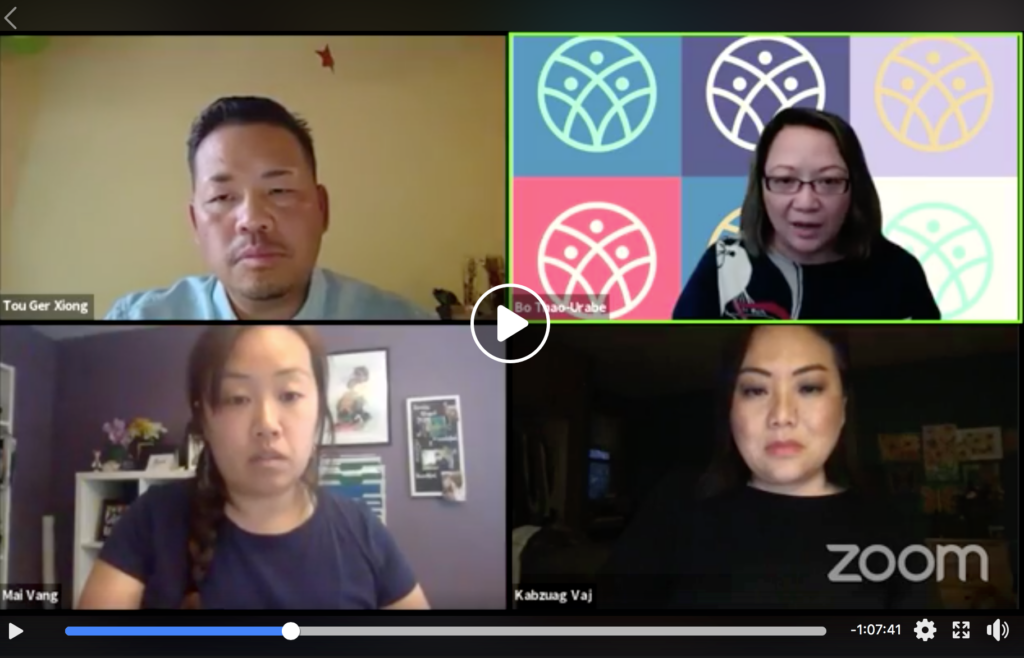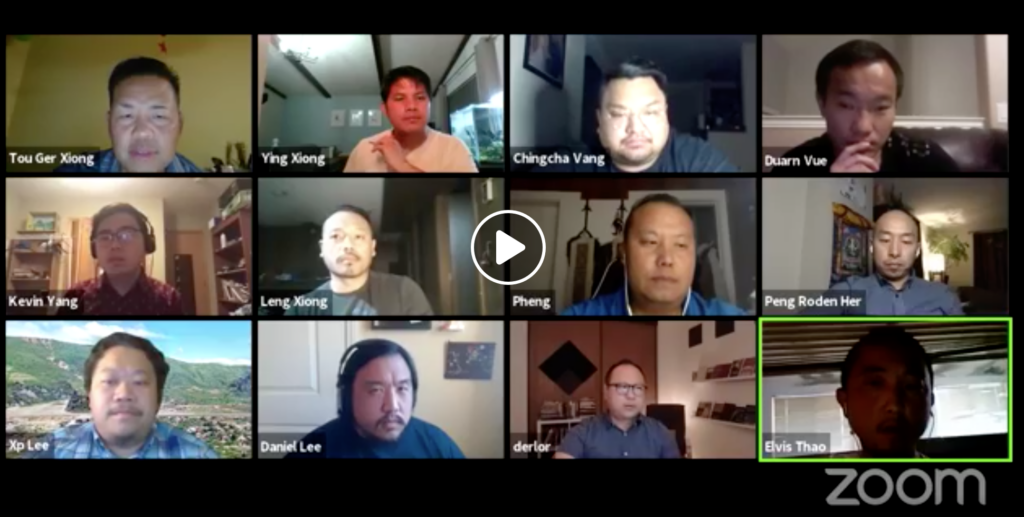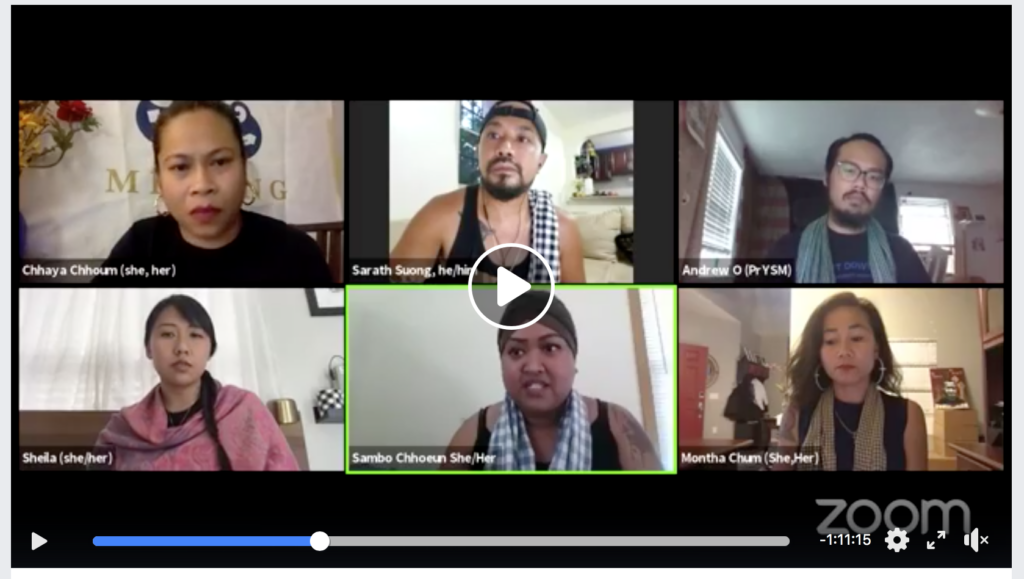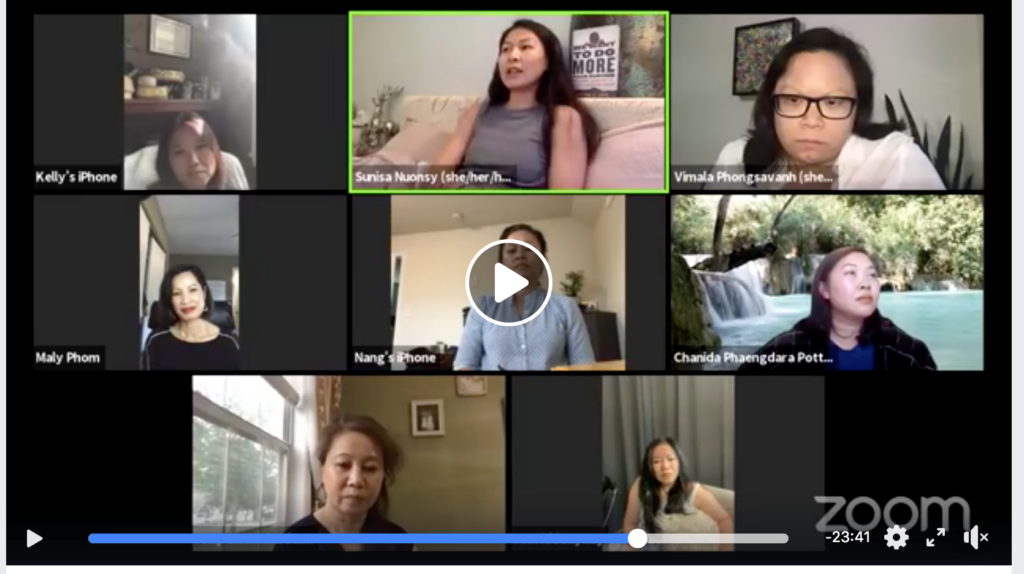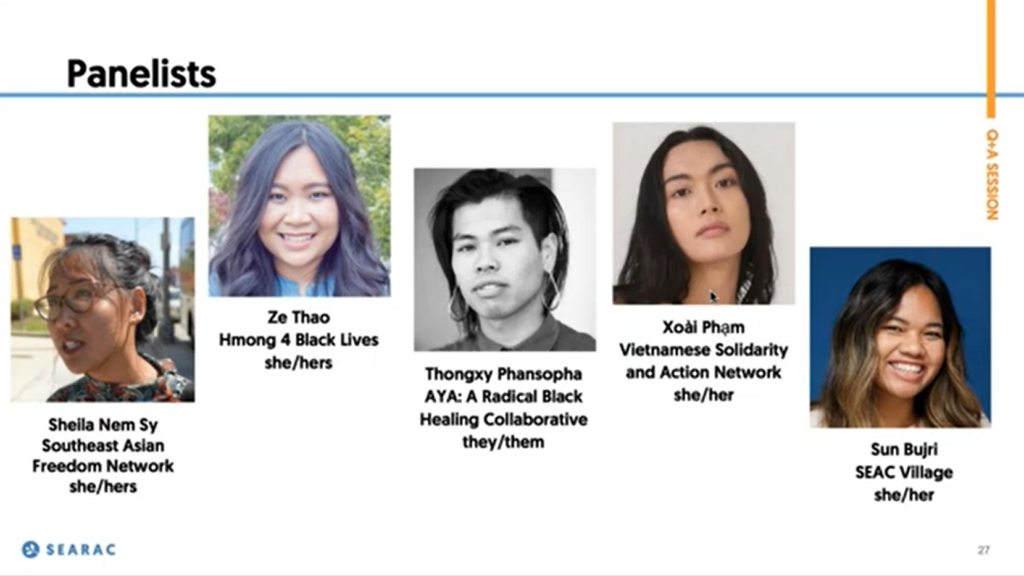SEAA Resources for Solidarity with The Movement for Black Lives

(Photo credit: Freedom Inc.)
Table of Contents
-
Articles
-
Organizational statements
-
SEAA-led community conversations
-
Protesting tips
-
Take action
-
Lessons from history
Articles
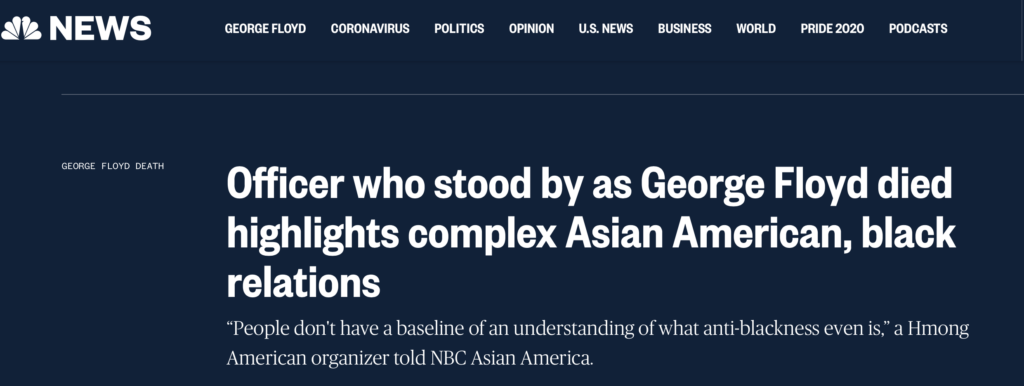
NBC News Asian America (6/1/2020) |
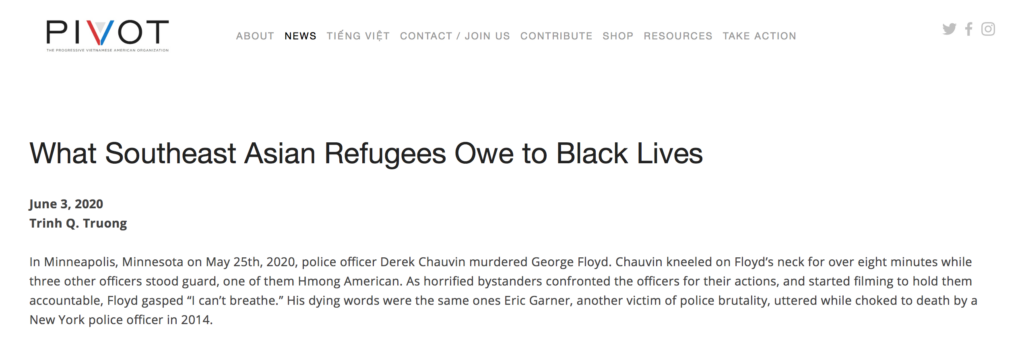
PIVOT (6/3/2020) |
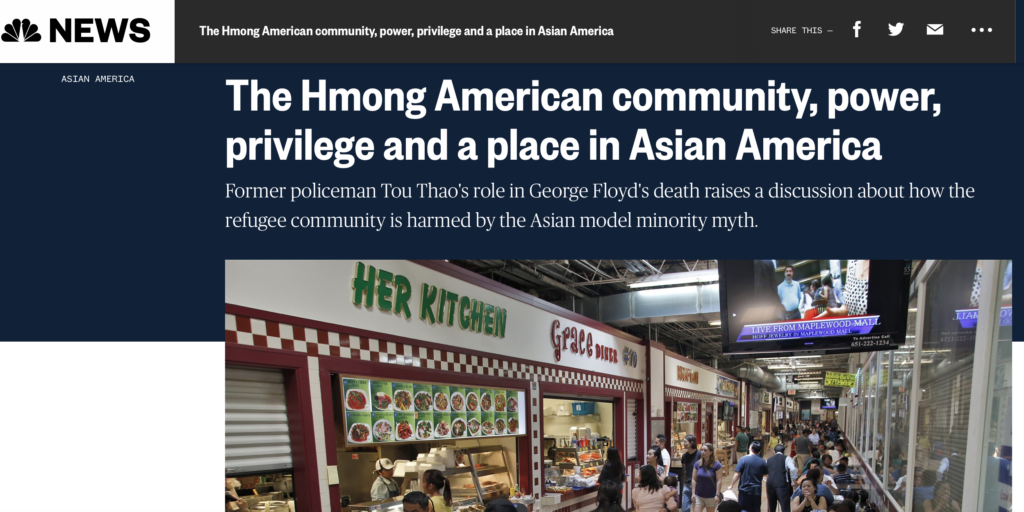
NBC News Asian America (6/8/2020) |
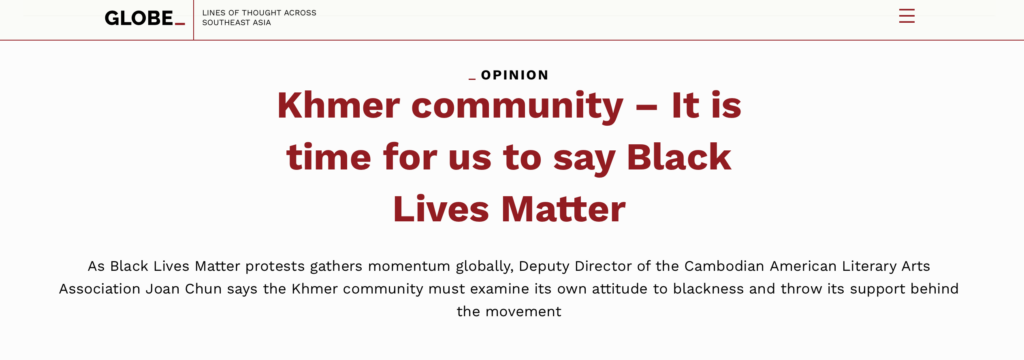
CALAA (6/15/2020) |
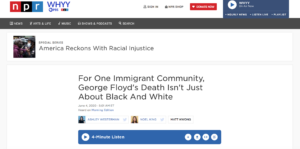
NPR (6/4/2020) |
Organizational Statements
(excerpts below)
- “George Floyd’s death is a continuation of the long history of criminalization, dehumanization, and oppression of Black lives in this country since its founding. As immigrants and refugees to the U.S., our families may not always understand this history, but we inherited its legacy. Our communities have also benefited from Black freedom struggles that paved the way for our own fights for freedom and equal treatment in America. So, in this moment, it matters that we commit to Black liberation and raise our voices to say that #BlackLivesMatter. We emphatically call on our Asian communities to center George Floyd’s life and continue to amplify the demands from his family and community for justice.” Coalition of Asian American Leaders MN
- “Five years ago, when we protested for Tony Robinson, these same acts were not considered peaceful. We marched, we chanted, and we stood on the Capitol steps. We chained ourselves to the doors of the jail, in demonstration of our rage, of our hurt, and our pain. We were called thugs and violent antagonizers– leading to the arrest of several Black leaders and demonstrators. Now, the antiblack media, elected officials, and some community leaders are using the events of last night to divide our community; to criminalize Black youth while holding us as the example of a “peaceful” protest. This is indicative of the insidious nature of white supremacist patriarchal capitalism; changing the narrative as a matter of convenience to separate, divide and conquer, while avoiding accountability for the violence bestowed upon Black bodies at the hands of the State. Please recognize that this is one of the many ways white supremacist patriarchal capitalism is perpetuated by progressive liberal cities like Madison, WI.” Freedom Inc
- “As refugees and descendents of refugees, as survivors of war and genocide, our communities also know the devastating impacts of police force. It is incumbant on us as Southeast Asian Americans to show up for the Black community. We must acknowledge that our own paths to equity are a direct product of their historic civil rights wins and struggles, that they continue to build, as well as to endure, to this day. We must name the systems that have benefitted from having communities of color pitted against one another, and we must boldly resist them.” SEARAC
- “We will not tolerate divisiveness, ignorance, hate, and violence against one another; especially during a time when we need to come together with grace, love, and solidarity for our Black communities. We share this while remembering what’s most important right now in our current movement for our shared liberation. Healing is needed and necessary between our Hmong and Lao communities. We must have these difficult conversations with one another in a safe and welcoming space, so we can be in relationship with each other.” United Letter from Laotian Leadership
SEAA-led Community Conversations
Hmong Americans, Black Lives Matter Movement, the George Floyd Murder, and where to go from here. A Community Dialogue (5/28)
Hosted by: Tou Ger Xiong
Watch video here
Speakers: Kabzuag Vaj (Freedom Inc), Maiv Yaj Vaj (Sacramento School Board), Bo Thao-Urabe (CAAL MN), You Ger Xiong (Community Member)
Hmong Male Accountability: A Conversation Among Non-Clan Leaders but Thought Leaders” A Facebook Live Event (5/30)
Hosted by: Tou Ger Xiong
Watch video here
Speakers: Duarn “The Storm” Vue (professional boxer), Pheng Thao (ManForward), Dr. Ying Xiong, (Hmong Healthcare), Xiongpao Lee (MN Council of Foundations), Leng Xiong (IT Administration), Der Lor (multi-ethnic church pastor), Chingcha Vang (teacher, Milwaukee, WI), Elvis Thao (actor/artist, Milwaukee, WI), Peng Roden Her (acupuncturist/Qigong Master), Daniel Lee (enterpreneur, LA, CA), Kevin Yang (multimedia artist)
Viets for Black Lives Community Discussion (6/5)
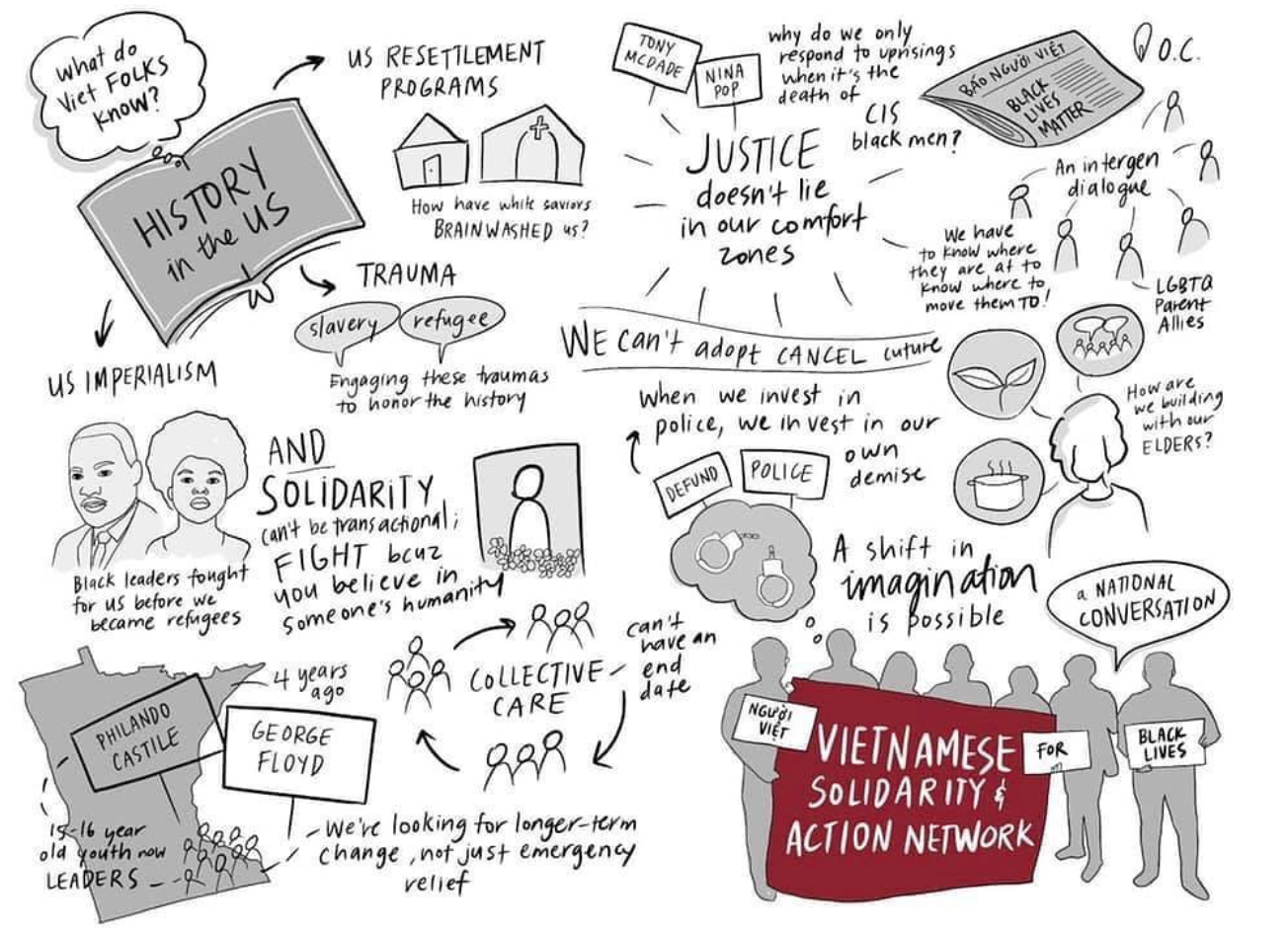
Hosted by: Viet Solidarity & Action Network, supported by SEAFN
Watch video here
Lead coordinators: MK Nguyen (Twin Cities), Michelle “Xèo” Nguyễn Bounkousohn (Mekong-NYC / SEAFN), thuan nguyen (Los Angeles)
Vietnamese language interpreters: Duong Nghe Ly, (VietLead Philadelphia), Ly Thúy Nguyễn (Irvine)
Graphic facilitation: Tracy Nguyen (San Jose)
Tech director: xoài phạm (NYC)
Chat monitors: Carolina Đỗ (NYC), Angela Kim Nhien Vo (Washington, D.C.), Andrew Nguyen (VietUnity-South Bay), Dieu Hoc Huynh (VietUnity-South Bay)
Transcribers: Phibi Tran (San Diego), Michelle “Xèo” Nguyễn Bounkousohn (Mekong-NYC / SEAFN), Tri Vo (Twin Cities)
Speakers: Nam Anh Nguyen (Twin Cities), Joan Dao (Twin Cities), Hien Nguyen (Asian Prisoner Support Committee, Oakland), Thao Le (VietUnity-South Bay), Kevin Lam (Dorchester Organizing and Training Institute / Asian American Resource Workshop, Boston), xoài phạm (NYC), Cathy Dang-Santa Anna (NYC), Nancy Nguyen (VietLead Philadelphia), Tin Nguyen (SEAC Village, North Carolina), Cat Bao Le (SEAC Village, North Carolina), David Dang (VietUnity-SoCal, Inglewood), Hieu Nguyen (VROC, Orange County), Stevie Vu (VROC, Orange County)
*Graphic illustrating this call by Tracy Nguyen @hellafly.graphics
In Defense of Black Lives: Cambodian Community Conversation (6/6)
Hosted by the Southeast Asian Freedom Network (SEAFN)
Watch video here
Lead coordinator: Sarath Suong
Tech assistants: Socheath Chum, Thida Virak
Speakers: Chhaya Chhoum (Mekong NYC), Sambo Chhoeun (Freedom Inc, MN), Montha Chum (Release MN8), Andrew Oung (PrYSM, RI), Sheila Sy (Long Beach), Sarath Suong (SEAFN)
Laotians for BLM Community Discussion (6/7)
Hosted by: Freelance Lao Interpreter and Blogger ນາຍພາສາມືໃໝ່
Watch video here
Speakers: Maly Siri-Phom- Sacramento, California; Chanida Phaengdara Potter- Minneapolis, Minnesota; Phoukham Kelly Bounkeua- Seattle, Washington; Amy Chomthakham- Atlanta, Georgia; Vimala Phongsavanh- Washington D.C; Ann Rithmy- Atlanta, Georgia; Sunisa Nuonsy- Brooklyn, New York; Nang Nonnarath- Portland, Oregon
SEARAC June Community Call (6/20)
Watch video here
A panel of Southeast Asian American organizers and youth leaders joined SEARAC’s community call to share about their on-the-ground experiences and their organizations’ actions to show up for and with the Black community.
AAPI/SEA toolkits and M4BL Solidarity Resources
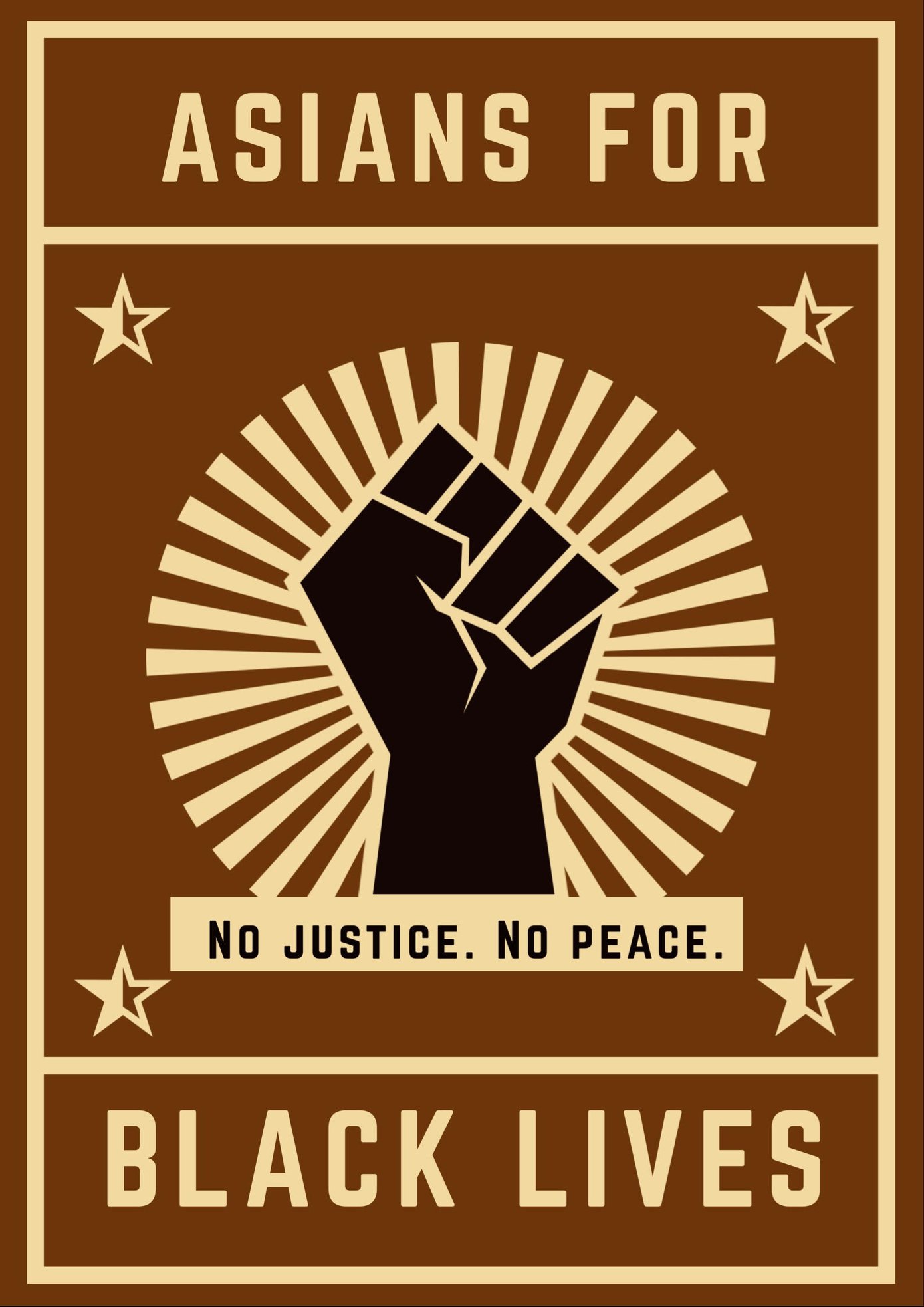
Graphic credit: Kalaya’an Mendoza, @kalamendoza (more info below)
The Movement for Black Lives (M4BL)
- Text 90975 for solidarity action updates
- M4BL Anti-Racism Support Resources
- M4BL Public Q&A
- Along with over 40 organizations, SEARAC co-sponsored the “Asian American Call with the Movement for Black Lives” webinar (6/16)
Hosted by: Gregory Cendana Can’t Stop! Won’t Stop! Consulting and Timmy Lu, AAPIs for Civic Empowerment & AAPIs for Civic Empowerment Education Fund
Watch video here
Speakers: Chhaya Chhoum (Mekong NYC & Southeast Asian Freedom Network – SEAFN), Cha Vang, (Hmong Innovating Politics), Esther Jeon (NAKASEC), Lumumba Bandele (Movement for Black Lives), Maurice Mitchell (Movement for Black Lives), M. Adams (Movement for Black Lives & Freedom Inc), Nikita Mitchell (The Rising Majority)
Infographic that summarizes content of the call below. Please feel free to share this on social media and make sure to tag or mention the artist Elizabeth Niarhos (@lizar_tistry) and the Movement for Black Lives (@mvmnt4blklives).
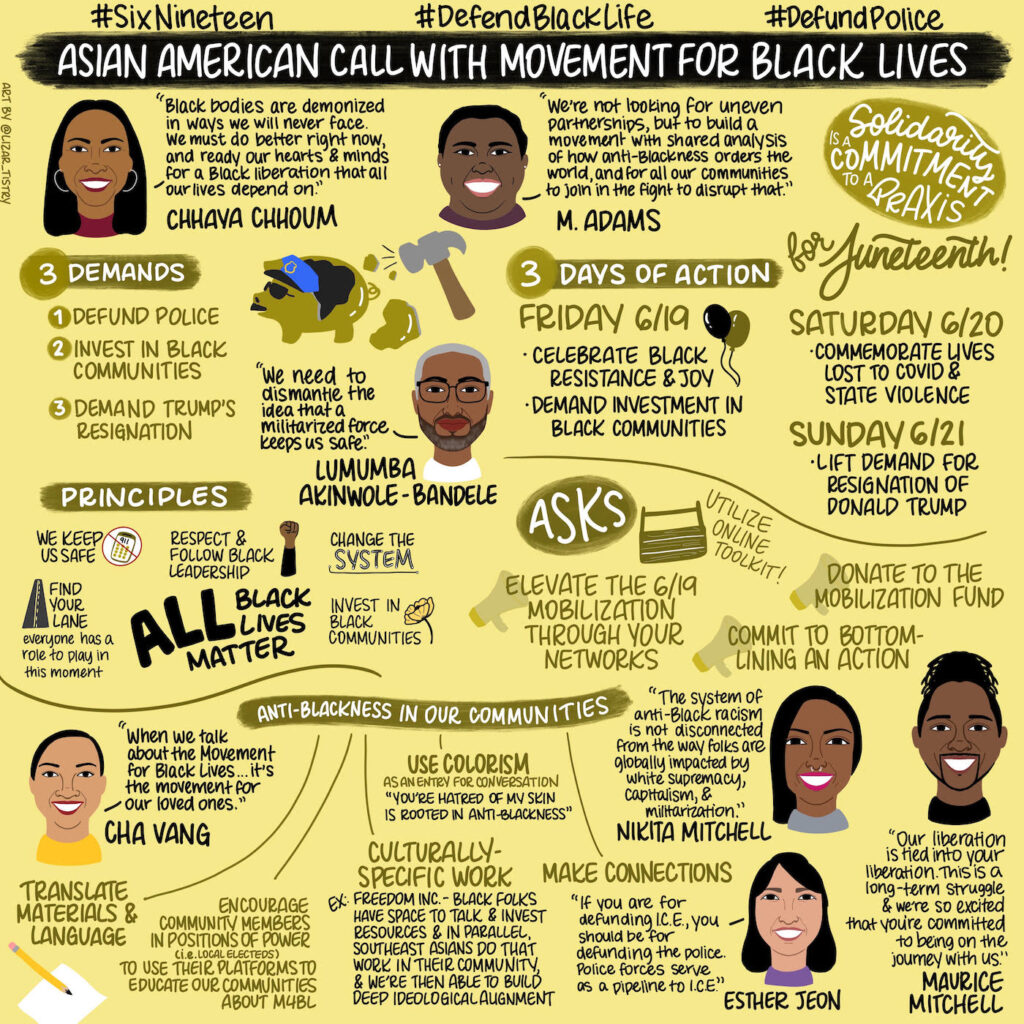
AAPI Collective for Black Solidarity: a discussion guide for talking to your AAPI people
How to talk to your Asian immigrant parents about racism
Black and Asian American feminist solidarities: A reading list
Resources for non-Black people and #Academics4BlackLives: Register for a weeklong personal and professional development initiative for academics to honor the toll of racial trauma on Black people, resist anti-Blackness and white supremacy, and facilitate accountability and collective action. It begins on Juneteenth (Friday, June 19) and lasts through Thursday, June 25, 2020.
Addressing Anti-Black Microaggressions in Filipino Families
The SEAD Project Solidarity Resource HuB
Southeast Asian Anti-Racist Toolkit
Solidarity for Black Lives posters (see above graphic) by Kalaya’an Mendoza. Email kala@acrossfrontlines.org for downloadable version to print.
Following the 2016 police killing of Alton Sterling, a 37-year-old Black man, a group of Asian Americans drafted Letters for Black Lives, a crowdsourced, multilingual letter to create space for conversations about racial justice. Addressed to “mom, dad, uncle, auntie, grandfather, grandmother,” the letter broaches topics of anti-Blackness in Asian communities.
-
- List of audio reading of letter in different languages (including American Sign Language)
- List of written translation of letters in different languages
- Cambodian/Khmer audio recording and translated letter
- Hmong translated letter
- Laotian translated letter
- Vietnamese translated letter
- Status of current translations
- Letters for Black Lives: Comic Edition (2017)
- How to write the letter specific for your community
- How to get involved with the crowdsource team
Protesting Tips
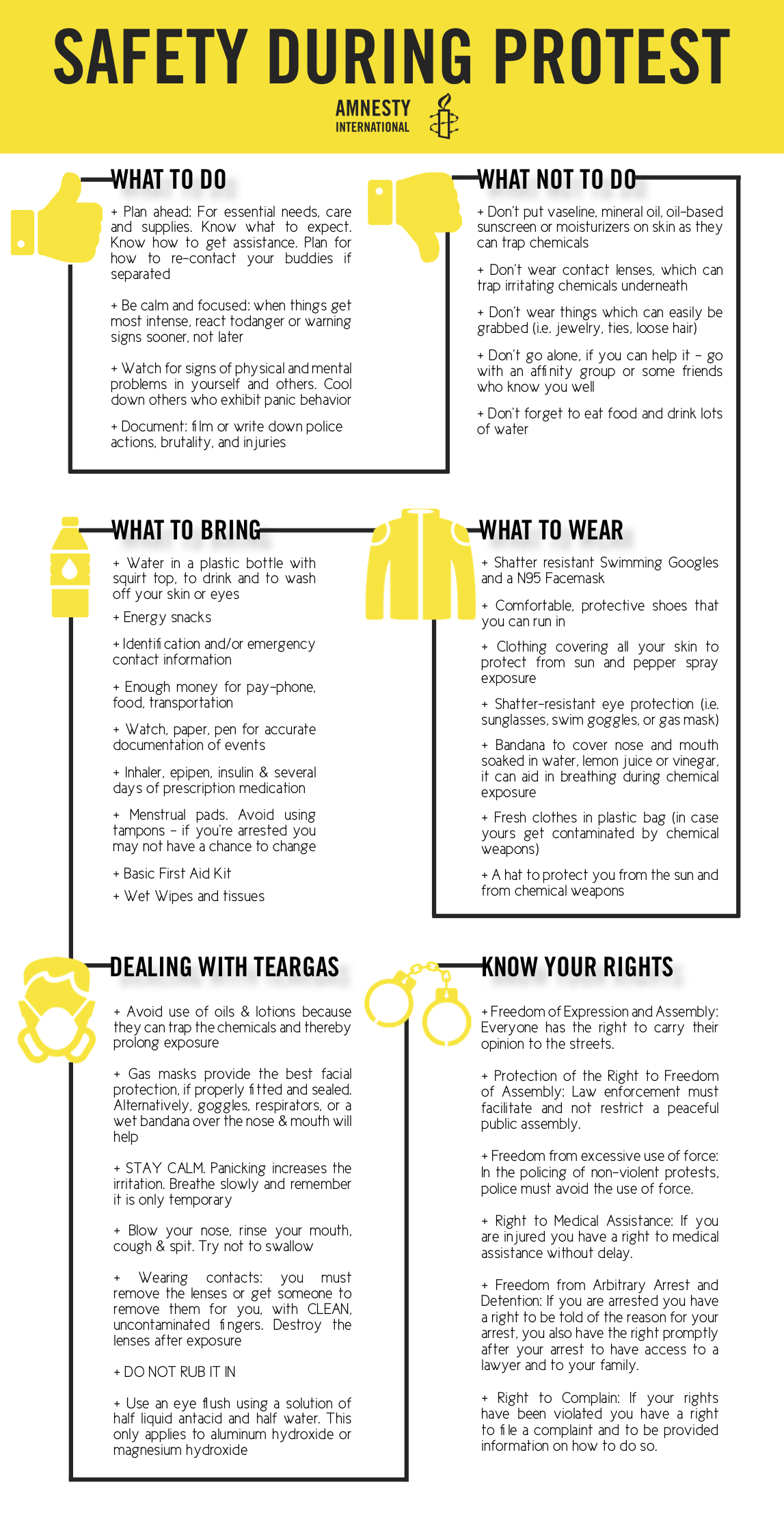
Read Amnesty International’s guide (above) on best practices and how to keep yourself safe.
Your right to peacefully protest is protected by the First Amendment. Be sure you know your rights before heading out by reading up on the ACLU’s guide for protesters.
If you are an undocumented protester, we urge you to take extra caution as Customs and Border Patrol officers have been called in to certain cities. Find the ACLU’s guide to protesters’ rights, with additional information for undocumented protesters.
If you are arrested while protesting, you may be able to find a lawyer in your area who is representing protesters pro bono.
Take Action
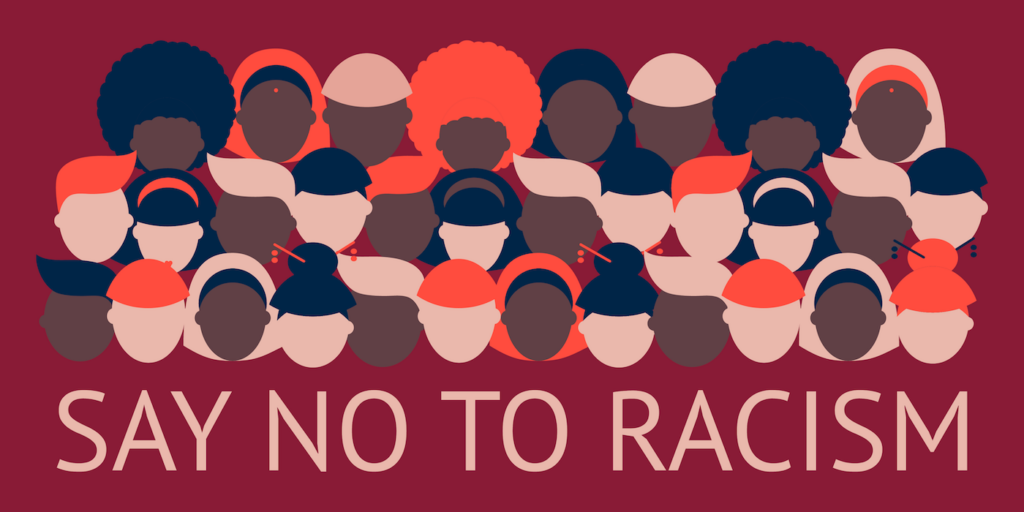
DONATE
- The National Bail Fund Network includes a series of local bail funds in jurisdictions that have bail (note that the city of DC does not have cash bail). Find your local bail fund supporting arrested protesters in your area.
- The Okra Project is an initiative that supports Black trans chefs and provides Black trans individuals with free, nutritious, and culturally specific meals. Support them directly here.
- LGBTQ+ protesters face unique challenges and safety concerns in detention. You can support the LGBTQ Freedom Fund, which works to post bail for and support LGBTQ+ individuals, here.
- Not sure where exactly to donate? Donate here, and your contribution will be split several ways to support local bail funds and anti-racist organizations around the country.
ADVOCATE
- Last year, The Leadership Conference Education Fund released a report “New Era of Public Safety”. The report and toolkit offer community-centered policy solutions to equip U.S. communities and police departments with best practices and recommendations for adopting 21st century policing models, including tools for advocacy.
- While the police officers involved in George Floyd’s killing have been arrested, those involved in Breonna Taylor’s murder have not. You can use this email template to call on the Louisville Metro Police Department and the Louisville Mayor’s Office to hold those officers accountable.
- Contact your city chief of police, city council, and/or mayor and call on them to implement de-escalation tactics and decrease use of police force. You can use this email template.
Lessons from History
This 1978 International Rescue Committee ad entitled “Black Americans Urge Admission of the Indochinese Refugees” in The New York Times documents the support of major Black leaders for the admittance of Southeast Asian refugees into the United States.
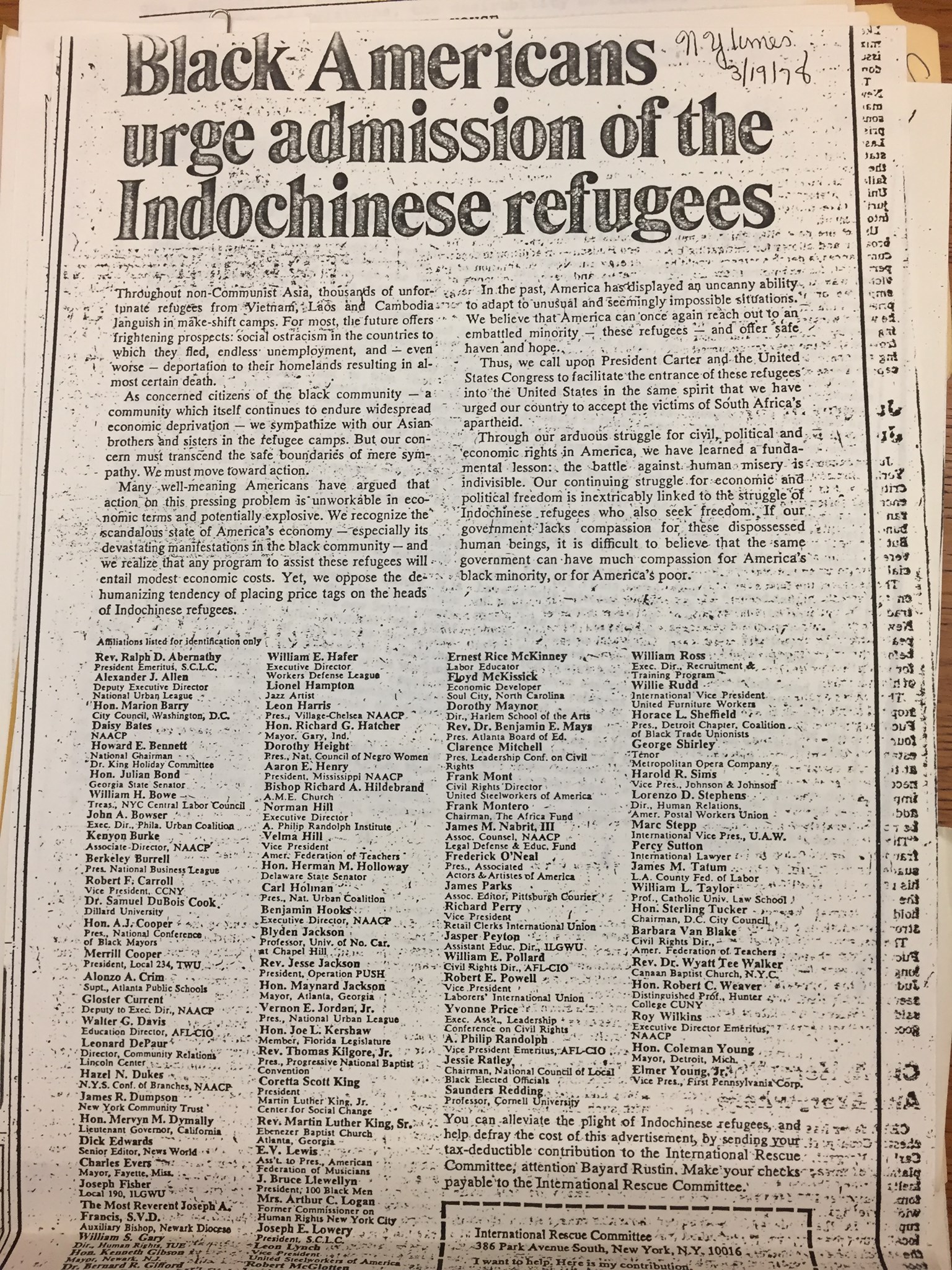
Transcribed by: Sarath S. Suong
New York Times ad image credit: Sokunthary Svay (co-founder of Cambodian American Literary Arts Association- CALAA) Svay shared this image on 5/30/2020, derived from her scholarly research conducted in the New York Public Library in 2018.)
Black Americans urge admission of the Indochinese refugees (New York Times, March 19, 1978)
Throughout non-Communist Asia, thousands of unfortunate refugees from Vietnam, Laos and Cambodia languish in make-shift camps. For most, the future offer frightening prospects: social ostracism in the countries to which they fled, end unemployment, and – even worse – deportation to their homelands resulting in almost certain death.
As concerned citizens of the black community – a community which itself continues to endure widespread economic deprivation- we sympathize with our Asian brothers and sisters in the refugee camps. But our concern must transcend the safe boundaries of mere sympathy. We must move toward action.
Many well-meaning Americans have argued that action on this pressing problem is unworkable in economic terms and potentially explosive. We recognize the scandalous state of America’s economy – especially its devastating manifestation in the black community – and we realize that any program to assist these refugees will entail modest economic costs. Yet, we oppose the dehumanizing tendency of placing price tags on the heads of Indochinese refugees.
In the past, America has displayed an uncanny ability to adapt to unusual and seemingly impossible situations. We believe that America can once again reach out to an embattled minority – these refugees – and offer safe haven and hope.
Thus, we call upon President Carter and the United States Congress to facilitate the entrance of these refugees into the United States in the same spirit that we have urged our country to accept the victims of South Africa’s apartheid.
Through our arduous struggle for civil, political and economic rights in America, we have learned a fundamental lesson: the battle against human misery is indivisible. Our continuing struggle for economic and political freedom is inextricably linked to the struggles of Indochinese refugees who also seek freedom. If our government lacks compassion for these dispossessed human beings, it is difficult to believe that the same government can have much compassion for America’s black minority, or for America’s poor.



